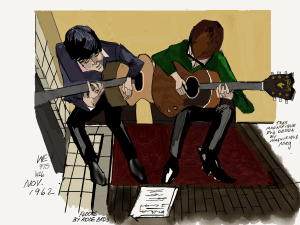Podcast: Play in new window | Download
In this episode, Richard and Robert trace the musical partnership of the Beatles’ two senior members. Songs include “I Saw Her Standing There,” “We Can Work It Out” and “A Day in the Life.”
April 2016 is upon us and so are the Something About The Beatles 2016 calendars – get one of the last remaining copies in stock here and specially priced!



Well researched, wonderfully executed, very listenable – never fail to learn something new with every show – no change there then. 10/10 guys.
I totally agree with what you say about paul and johns contributions to each others songs, and George’s. But totally, totally disagree with Roberts with you on sgt peppers. It’s not my go to beatles album but it is a fantastic album never the less. There is something about it that takes you on a journey, even though the songs have no link to each other. Love your shows by the way
Great show as usual. R.e. Pepper. You really had to be there. Rushing down to town on the day of release, buying it, taking it home on the top of the bus and looking at the cover in amazement. It had lyrics you could read all the way home.
Then playing it on the mono record player and being absolutely floored and mind blown by the music, the like of which no-one had ever heard before.
That’s what Pepper means to me, although not my fave Beatles album.
These shows are archival, they are that good. Love all the early Lennon/McCartney performances, never heard half of them.
Re “Eleanor Rigby”, I am always intrigued with the songwriting dispute about this. Lennon said he wrote about “80%” of the lyrics in 1970 Rolling Stone interview, “at least 50%” of them in heated George Martin reply letter to Melody Maker in “1971”, then evolved to “Paul’s baby, I helped with the education of the child” in 1980 Playboy. Paul, in probably his only actually candid “interview” (really an upset conversation where he didn’t know Hunter Davies was taking notes in early 1981) said that he’d seen John take credit for helping write Rigby and said dismissively “yeah, about half a line”.
What was going on with that song?
Oh and I think John said Paul already had the first verse, which includes the line “wearing the face that she keeps in a jar by the door”.
Love this show, look forward to it every week. Keep it up!
https://www.mixcloud.com/jamiescott24/roger-scott-a-history-of-the-beatles-years-1962-1970-9-parts/
I’m listening to this Roger Scott series. at 1hr 9 mins in there’s an interesting clip from an interview with Paul who says the early songs he and John wrote numbered around 50 and many weren’t that good because they were experimenting trying to find ‘the next beat’ They’d heard about calypso and Latin rock, and were trying to predict what the next ‘in’ rhythm would be.
I often describe the Beatles albums as being four triads influenced by the drug of choice — the first three (Please Please Me, With The Beatles, A Hard Day’s Night) are the cigarettes, alcohol and preludin albums, the next three (Beatles For Sale, Help!, and Rubber Soul) are the marijuana haze albums, Revolver, Sgt. Pepper and the Magical Mystery Tour period are the lysergic experience albums, and The Beatles, Get Back and Abbey Road are Lennon’s heroin and George’s transcendental meditation (not a drug per se but certainly consciousness altering) albums. Another killer discussion, gents!
While nobody with much knowledge of The Beatles believes any of the “Paul is dead” mythology, something you discussed in this episode provides the most definitive proof that McCartney could not have died in 1966, or even up to 1969, after the gossip began.
John and Paul begin playing some of their earliest compositions during the Twickenham sessions. An imposter couldn’t possibly know any of those at that time, especially during an impromptu jam setting. The level of coaching and scripting required would mean that the entire break up and all of its nuances had been carefully scripted and rehearsed, and they couldn’t have found anywhere near the time needed to accomplish that.